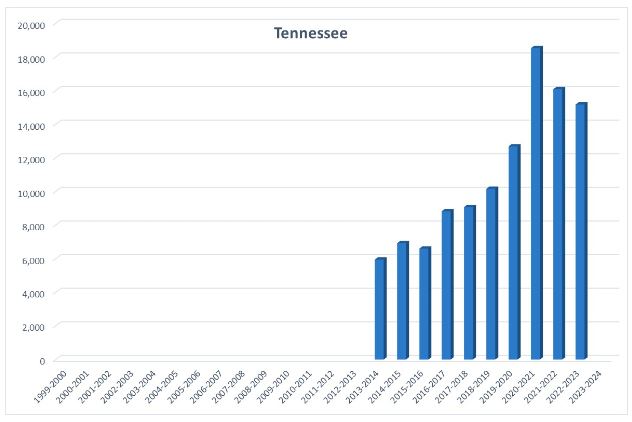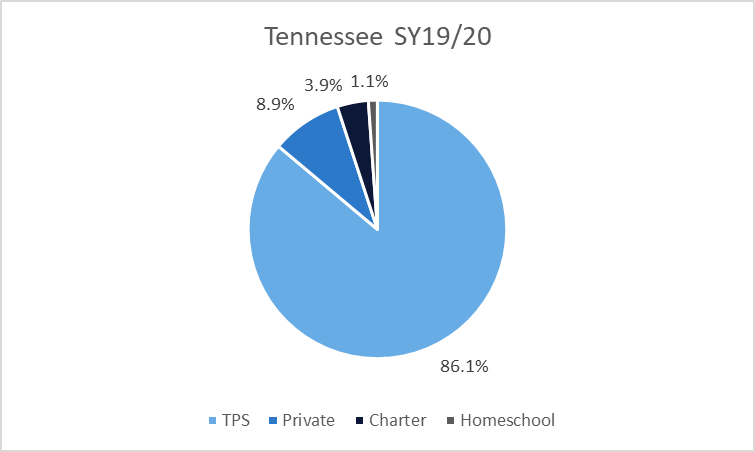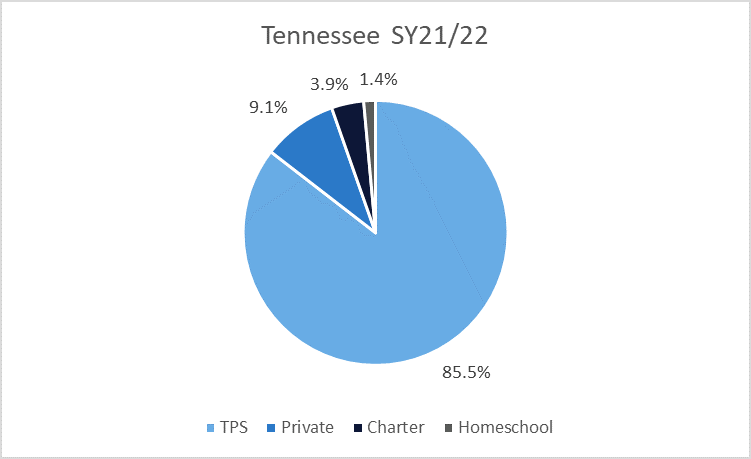Tennessee offers families three ways to homeschool their children but “independent homeschools” most closely resemble the homeschooling found in other states.
History
Tennessee is located in the southern United States. The state legalized homeschooling in 1985, recognizing at least three options for educating from home, and defines homeschooling as parent-directed.
Regulation
Parents in Tennessee who want to educate their children, ages 6 to 17, have several options. First, they can set up an “independent home school” where the parent is the educator of record. The second option is to homeschool under the “umbrella” of another organization. In this case, the homeschool becomes a church-related school and is viewed as a “satellite” program. The third option is schooling from home but attending an online school that is accredited by the state board of education. The remainder of this section focuses on the requirements for independent home schools since those most closely reflect the mode of homeschooling regulated in other states.
Independent homeschools must file an Intent to Home School Form each year with the local school district. These forms include the names, ages, and grade levels of each child in the school. The local school district may want to know the curriculum used, but it is up to the parent to select it. Parents must have at least a high school diploma or equivalent, and a tutor may provide instruction. Students must receive a minimum of four hours of instruction daily for at least 180 days a year. Tennessee requires homeschooled students in certain grades to take the state test, and low scores on the test could cause the superintendent to request enrollment in a public or private school. There are no requirements on subjects or record keeping.
Tennessee does not provide any access for its nonpublic students to any of the offerings in public schools. Some homeschooled students may have limited access to extracurricular activities, as determined by the school principal, but other nonpublic students do not have this opportunity. (see Tenn.Code Ann. S49-6-5030.) Access for homeschooled students with special needs to services is unclear.
State Data
Tennessee reports homeschool participation for the last decade, starting in 2013. Homeschool participation in Tennessee increased dramatically during the pandemic. For example, more than 18,000 students were homeschooled in 2020-21, compared to just 10,000 in 2018-19.

U.S. Census estimates indicate that around 5.4% of Tennessee families homeschooled in the spring of 2020 and increased to 13.2% by the fall of 2020. These percentages are similar to the national averages at the time, at 5.4% and 11.1% respectively. Based on U.S. Census data, our calculations indicate that about 9.02% of K-12 students in Tennessee were homeschooled during the 2022-23 school year, and 10.75% during the 2023-24 school year. Due to survey changes, the data from 2020 reflects the percentage of households, while the data from following years reflects the percentage of students.
Cross-Sector Comparison
During the 2019-20 academic year, 1.1% of Tennessee’s K-12 students were homeschooled. Homeschool participation in the state was much less than the 8.9% of private school students. Homeschool participation was also much lower than the 3.9% of Tennessee students attending charter schools. In 2021-22, 1.4% of Tennessee’s K-12 students were homeschooled, while private and charter school attendance remained nearly unchanged at 9.1% and 3.9%, respectively.


School Choice Context
In addition to homeschooling, parents in Tennessee have multiple school choice options. These include traditional public schools with inter- and intra-district choice, private, magnet, charter, and virtual schools. For some families, Tennessee launched a new education savings account in 2021, but it is unclear if independently homeschooled students qualify. Some homeschooled students may meet the requirements if they meet the income and other requirements and live in one of the eligible counties.
Commentary
Tennessee could provide more educational opportunities for the students in the state by expanding access to public school offerings like courses, extracurriculars, and sports to all nonpublic students. Much of the country is moving in this direction, and while Tennessee allows some access, it is limited.

-
13.2% Families
Around 13.2% of families in Tennessee homeschooled during the height of the pandemic (Fall 2020).
-
1985 Legalized
Homeschooling was legalized in 1985 in the state of Tennessee.
-

-
More Information
13.2% Families
Around 13.2% of families in Tennessee homeschooled during the height of the pandemic (Fall 2020).
1985 Legalized
Homeschooling was legalized in 1985 in the state of Tennessee.

More Information
Last updated March 2025.